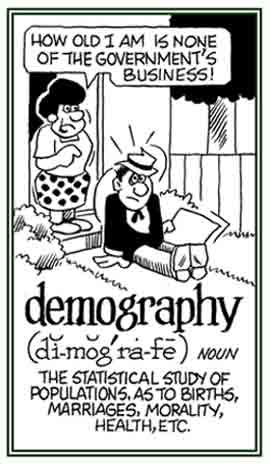demo-, dem-, demio-, -demic, -deme, -demically
(Greek: people, population)
From Greek: district, country, land, and the people who inhabit those areas or territories.
1. Someone who studies human populations, including their size, growth, density, and distribution, and statistics regarding birth, marriage, disease, and death.
2. One who specializes in human statistical data.
2. One who specializes in human statistical data.
demographic (adjective), more demographic, most demographic
Relating to demography or demographics.
The characteristics of a human population or part of it; especially its size, growth, density, distribution, and statistics regarding birth, marriage, disease, and death (requires a plural verb).
The study of human populations, including their size, growth, density, and distribution; as well as, statistics regarding births, marriages, diseases, and deaths: In her sociology class at college, Susan became very interested in the demography in her area and decided to learn more about the residents in her community.

© ALL rights are reserved.
Go to this Word A Day Revisited Index

Go to this Word A Day Revisited Index
so you can see more of Mickey Bach's cartoons.
The apparent excessive attachment to the "common people".
Someone who is perceived to have an excessive attachment to the "common people".
A word that indicates the members of a people or the inhabitants of a country.
In English, the name of a people's language is often the same as this word; such as, the "French" (which refers to the language and/or the people).
Having a fondness or love of people; a friend of the people.
A person who has a fondness for people: Susan was a very gregarious person who just loved being with other people, and, as a demophile, she joined many clubs in her town.
Having a special interest in the lives and habits of the masses.
demotic (adjective), more demotic, most demotic
1. Relating to or involving ordinary people.
2. Relating to a simplified form of hieroglyphics, the writing system used in ancient Egypt. Literally, "of the people".
2. Relating to a simplified form of hieroglyphics, the writing system used in ancient Egypt. Literally, "of the people".
endemic (adjective), more endemic, most endemic
1. Used to describe a disease occurring within a specific area, region, or locale; such as, a disease that exists permanently in a particular region or population. Malaria is a constant worry in parts of Africa.
2. Characteristic of a particular place or among a particular group or area of interest or activity. Literally, "in the people".
3. In ecology, of or relating to a native species or population occurring under highly restricted conditions as a result of the presence of a unique environment factor that limits its distribution.
2. Characteristic of a particular place or among a particular group or area of interest or activity. Literally, "in the people".
3. In ecology, of or relating to a native species or population occurring under highly restricted conditions as a result of the presence of a unique environment factor that limits its distribution.
A swelling of the thyroid gland caused by a lack of iodine in the diet in certain geographic areas; especially, in mountain regions as the Alps, Andes, and Himalayas.
The characteristic of being a disease that occurs persistently in a geographic area or among a given population or group.
The study of endemic disease which occurs persistently in an area or among a given group of people


